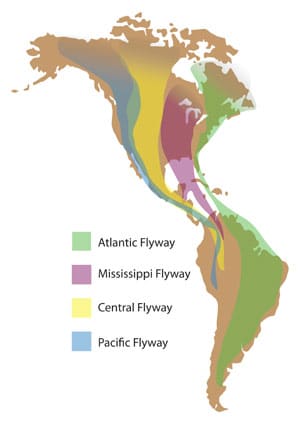6 Ways You Can Protect Important Bird Areas
This activity comes to us from the educators at the Prospect Park Audubon Center. Check out our Audubon at Home page for more nature fun.
Did you know that birds, like people, have their own highways? These are called Flyways, and many bird species migrate long distances every year along these routes. Like us on long car trips, these birds occasionally stop to rest and refuel.

There are four major Flyways in North America: Atlantic, Mississippi, Central, and Pacific. Prospect Park falls within the Atlantic Flyway and serves as a major resting area for birds during their travels. This makes Prospect Park an excellent place to go bird watching for migrating species, and it also means that if the park is not kept green and healthy, those birds could be in danger. For this reason and others, Prospect Park has been designated an Important Bird Area (IBA) and we work hard to keep it safe for our feathered friends.
Here are 6 ways that you as a park visitor and resident on the Atlantic Flyway can help keep migrating birds safe:
Carry-In, Carry-Out
This means two things. The first is that everything you bring into the park and other natural spaces should leave with you. Check your area when you leave the park—don’t leave anything behind and don’t litter. Use proper trash receptacles when necessary, but ideally, take your trash with you and dispose of it when you return home.
The second meaning is that you should leave the park with only what you brought. Please don’t take anything natural out of the park—sticks, rocks and flowers are all important parts of the ecosystem. Leave them for the wildlife to enjoy.
Turn Off Your Lights At Night
The bright lights of the city at night can confuse migrating birds and disrupt their migrations. Many songbirds travel at night. Artificial lights attract them to buildings which leads to collisions. Turn off unnecessary outdoor lights to help keep our feathered friends on track.
Prevent Bird Strikes
Millions of birds are killed every year flying into windows they can’t see. Help prevent this by putting screens, blinds, tape stripes, or stickers to make the window more visible. To learn how to make your own bird strike sticker, check out our Save a Bird With a Sticker craft.
Avoid Using Pesticides
Most pesticides include chemicals that are designed to be deadly to unwanted species like bugs. But many migrating birds love to snack on bugs, and the use of pesticides can be harmful. Pesticides can make birds sick and reduce their food supply. Pesticides can be found in products you may not think of such as flea collars or bug repellants.
Keep Your Cat Inside
Domestic cats are impressive hunters, and unfortunately they are responsible for billions of bird deaths every year. Letting your cat wander outside is not only dangerous for birds but for your cat as well. Keep your cat indoors for all creature’s health and safety.
Participate In Community Science
Knowing which bird species and how many visit our park helps us know if our conservation efforts are working or if they need to be changed. By sending your findings to naturalists you can help them with their work. Try the iNaturalist app or eBird, a site specifically for logging bird sightings, to add your observations to databases.
Learn more about birdwatching in Prospect Park.
Glossary Of Terms
Flyways – A route regularly used by large numbers of migrating birds.
Migrating – To move from one region or habitat to another according to the seasons.
Artificial – Made by people, not found in nature.
Pesticide – Chemicals designed to be deadly to unwanted species.
Domestic – Kept and raised by humans.
Conservation – To protect and keep in a good condition.